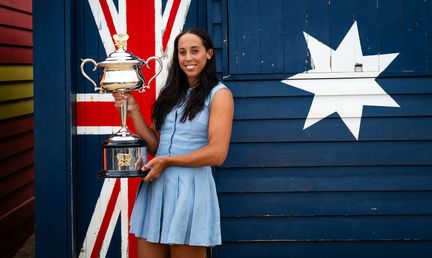Quality inevitably reveals itself.
Two-time Australian Open champion Aryna Sabalenka has won 11 consecutive matches. Jessica Pegula -- into her first major final -- has won 15 of 16.
They last met three weeks ago in the final of the WTA Tour 1000 event in Cincinnati. Sabalenka won a briskly contested 6-3, 7-5 match. One of them will triumph in Saturday’s US Open final (4 p.m. ET), the year’s fourth and final Grand Slam.
And so, for the ninth time in 10 years, there will be a first-time US Open champion. Naomi Osaka (2018, 2020) is the only exception.
Sabalenka has a 5-2 head-to-head advantage, but Pegula is in uncharted territory. After losing in six consecutive major quarterfinals, she’s cracked that code with back-to-back wins over World No.1 Iga Swiatek and Karolina Muchova.
Courtney Nguyen and Greg Garber make the case for the two finalists:
Advantage, Sabalenka
This really isn’t a fair fight.
Beginning with her title run in Cincinnati, Sabalenka has won 11 consecutive matches. She was a straight-sets winner over World No.1 Iga Swiatek in the semifinals and Jessica Pegula in the final. She’s dropped only one set in New York and yielded only three games to Olympic gold medalist Zheng Qinwen in the quarters and cooled off red-hot Emma Navarro in the semifinals.
This Grand Slam hard-court combination is Sabalenka’s jam. Her career record in this very specific category is 49-11 (.817), the best among currently active women.
And how about this? While Muchova came into this tournament without a single win in the majors, Sabalenka has an ethereal 17-1 record so far this year. No. 18 is only a day away.
It's all on the line on Saturday! pic.twitter.com/TnWZkzDDCl
— US Open Tennis (@usopen) September 6, 2024
After losing last year’s final to Coco Gauff, she’s determined to make amends. Back in the day, she was emotional and inconsistent. Against Navarro, there was fire in her eyes, and she rarely betrayed even a whiff of concern. Even when Navarro rallied in the second set -- and the pro-American crowd got into the match just like it did a year ago -- Sabalenka didn’t flinch.
“Last year it was very tough experience, very tough lesson,” Sabalenka told reporters. “Today in the match, I was, like, `No, no, no, Aryna, it’s not going to happen again. You have to control your emotions. You have to focus on yourself.’”
Consider this: Sabalenka is only the sixth woman in the Open Era to reach the final in four consecutive Grand Slam events on hard court -- after Martina Navratilova, Steffi Graf, Martina Hingis Monica Seles and Victoria Azarenka, the last to do it in 2012-13.
And although it feels like Sabalenka’s been playing for years, at 26 she’s the youngest to reach back-to-back finals here since Azarenka.
Against Navarro, Sabalenka ramped up her already amped-up game. She finished with eight aces -- and 34 winners to go with 34 unforced errors. That’s the clinical definition of going for it.
No woman at this US Open has hit more than Sabalenka’s 165 winners.
At the same time, she’s moving forward with great success. Sabalenka won 14 of 17 net points against Navarro, a strategy she also employed against Elise Mertens, winning 19 of 26.
“We had a lot of great battles in the past, really difficult, tight matches,” Sabalenka said of Pegula. “She’s playing really incredible tennis. Feels like she’s back on track. Cannot wait to play against her.” -- Greg Garber
Advantage, Pegula
No one is arguing Sabalenka isn’t the favorite to win on Saturday. In fact, that’s the point. She is.
Sabalenka was the favorite to win against an American last year, too. Instead, Gauff’s grittiness, buoyed by the raucous partisan crowd, boosted the then-19-year-old to a come-from-behind victory.
Miss Americana and her American Dream 😍
— wta (@WTA) September 6, 2024
We’ll see you in the finals, @JPegula!#USOpen | @usopen pic.twitter.com/OE58IyP5oe
Pegula has built her late-blooming career on the ability to make her opponents implode. Her relentless baseline pressure, which only improved under her new coaches, Mark Knowles and Mark Marklein, can crack anyone. We saw that in how she gave No.1 Iga Swiatek no inroads in a 6-2, 6-4 rout this week, a win that snapped Pegula’s 0-6 drought in major quarterfinals. We saw it again 24 hours later, when she lost eight of the first nine games against Karolina Muchova, only to come back to win in three physical sets.
“She started to play way better with the match,” Muchova said. “The balls had better depth. So it was tough for me to get on the net and to play these aggressive points. Then it was a battle, and then I felt like I was getting more and more slower and she was still there.”
Pegula will return to No.3 on the PIF WTA Rankings after the tournament, sitting behind Swiatek and Sabalenka. She may not have the thunderous strokes or the flashy athleticism embodied by the two women ahead of her, but hers is a game built on unrelenting body blows.
Jessica Pegula really has been moving different this summer. pic.twitter.com/pRilUDDm4q
— US Open Tennis (@usopen) September 6, 2024
“It's never easy to play against Jess,” Swiatek said. “She has a tricky ball because it's pretty low and pretty flat. She was for sure more solid than me and making much less mistakes. So because of that, she was putting pressure with that.”
It took a near-perfect serving performance from Sabalenka to hand Pegula her only loss of the hard-court summer in the Cincinnati final.
"She served unbelievable, and I felt like I still had chances in that match," Pegula said. "So hopefully she doesn't serve that good Saturday. Maybe a little bit less would be nice.
"But I think I know that I can have a game that can possibly frustrate her."
Eleven years ago, a similar scenario played out during the summer hard courts on the Hologic WTA Tour. In 2013, Serena Williams took the title in Canada and followed that up with a final in Cincinnati. There, Williams was beaten by Victoria Azarenka. Three weeks later, the two faced each other again in the US Open final. Williams got her revenge, winning in three sets to take the title.
Will history repeat itself on Saturday? If it does, Pegula will become the first woman since Maria Sharapova to beat No.1 and No.2 en route to the US Open title.
"If you would have told me at the beginning of the year I'd be in the finals of the US Open, I would have laughed so hard, because that just was where my head was, was not thinking that I would be here," Pegula said.
"So to be able to overcome all those challenges and say that I get a chance at the title Saturday is what we play for as players, let alone being able to do that in my home country here, in my home Slam. It's perfect, really." -- Courtney Nguyen







